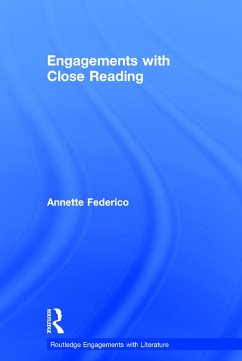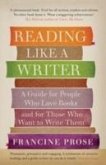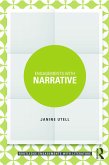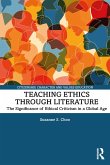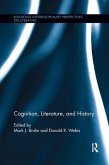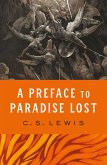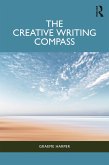What should we do with a literary work? Is it best to become immersed in a novel or poem, or is our job to objectively dissect it? Should we consult literature as a source of knowledge or wisdom, or keenly interrogate its designs upon us? Do we excavate the text as an historical artifact, or surrender to its aesthetic qualities?
Balancing foundational topics with new developments, Engagements with Close Reading offers an accessible introduction to how prominent critics have approached the task of literary reading. This book will help students
learn different methods for close reading
perform a close analysis of an unfamiliar text
articulate meaningful responses
Beginning with the New Critics and recent argument for a return to formalism, the book tracks the reactions of reader-response critics and phenomenologists, and concludes with ethical criticism's claim for the value of literary reading to our moral lives. Rich in literary examples, most reprinted in full, each chapter models practical ways for students to debate the pros and cons of objective and subjective criticism. In the final chapter, five distinguished critics shed light on the pleasures and difficulties of close reading in their engagements with poetry and fiction.
In the wake of cultural studies and historicism, Engagements with Close Reading encourages us to bring our eyes back to the words on the page, inviting students and instructors to puzzle out the motives, high stakes, limitations, and rewards of the literary encounter under the pressure of this beleaguered and persistent methodology.
Balancing foundational topics with new developments, Engagements with Close Reading offers an accessible introduction to how prominent critics have approached the task of literary reading. This book will help students
learn different methods for close reading
perform a close analysis of an unfamiliar text
articulate meaningful responses
Beginning with the New Critics and recent argument for a return to formalism, the book tracks the reactions of reader-response critics and phenomenologists, and concludes with ethical criticism's claim for the value of literary reading to our moral lives. Rich in literary examples, most reprinted in full, each chapter models practical ways for students to debate the pros and cons of objective and subjective criticism. In the final chapter, five distinguished critics shed light on the pleasures and difficulties of close reading in their engagements with poetry and fiction.
In the wake of cultural studies and historicism, Engagements with Close Reading encourages us to bring our eyes back to the words on the page, inviting students and instructors to puzzle out the motives, high stakes, limitations, and rewards of the literary encounter under the pressure of this beleaguered and persistent methodology.
'All purposeful reading begins with careful close reading. Federico's engaging discussion, supplemented with excellent illustrations and a set of detailed sample close readings by major scholars and teachers, effectively de-mystifies this essential tool, opening new pathways to fuller understanding and greater appreciation of literature. This is an accessible and immediately useful contribution to literary studies.' Stephen C. Behrendt, University Professor and George Holmes Distinguished Professor of English, University of Nebraska, USA
'Annette Federico's book reminds us it's okay to like what we read and gives us carefully explained ways to help us understand how to read closely. Her erudition is everywhere apparent as she moves dexterously from critic to critic and unpacks for us their tools. She does this is in an easy and direct prose that is reliably clear and refreshing. I think this book is a significant restorative for the rewards of reading literature.' Ralph Alan Cohen, Gonder Professor of English, Mary Baldwin College, USA
'The increasing attention being given today to the forms and textures of literary works is reflected in this lively book, which offers both an informed account of the resurgence of close reading in its many varieties and a useful set of exemplary readings.' Derek Attridge, Professor of English, University of York, UK
'Annette Federico's succinct and rewarding new study offers a finely attuned, perceptive and richly suggestive account of the current debate about the so-called 'return to the text'. This is a book which makes a timely, thoughtful and fertile intervention in respect to our renewed attention to the words on the page.' Roger Ebbatson, Lancaster University, UK
'Annette Federico's book reminds us it's okay to like what we read and gives us carefully explained ways to help us understand how to read closely. Her erudition is everywhere apparent as she moves dexterously from critic to critic and unpacks for us their tools. She does this is in an easy and direct prose that is reliably clear and refreshing. I think this book is a significant restorative for the rewards of reading literature.' Ralph Alan Cohen, Gonder Professor of English, Mary Baldwin College, USA
'The increasing attention being given today to the forms and textures of literary works is reflected in this lively book, which offers both an informed account of the resurgence of close reading in its many varieties and a useful set of exemplary readings.' Derek Attridge, Professor of English, University of York, UK
'Annette Federico's succinct and rewarding new study offers a finely attuned, perceptive and richly suggestive account of the current debate about the so-called 'return to the text'. This is a book which makes a timely, thoughtful and fertile intervention in respect to our renewed attention to the words on the page.' Roger Ebbatson, Lancaster University, UK

